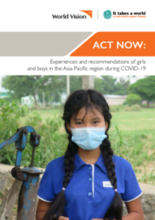childrens_living_arrangement
children_living_without_bio
Displaying 141 - 150 of 427
This consultation explores children and young people’s views and experiences related to COVID-19 and its secondary impacts.
This presentation - delivered by Marinus van IJzendoorn at a 18 November 2020 meeting of the Evidence for Impact Working Group, a working group of the recently launched Transforming Children's Care Global Collaborative Platform - presents evidence of the harmful impacts of institutionalization on children, demonstrates some of the benefits of deinstitutionalization for getting children back on track, and raises questions about gap-year volunteers working in orphanages.
This panel discussion is a pre-event ahead of the International Care Leavers’ Convention 2020. The aim of the webinar is to provide an insight into global research on leaving care processes as well as into research activities of care leavers.
This discussion session for careleavers comes ahead of the International Care Leavers Convention on 23-25 November 2020.
The India Alternative Care Network (IACN) held a website launch event on 21 October 2020.
The India Alternative Care Network (IACN) is hosting a website launch event on 21 October 2020 (Wednesday) at 5 P.M IST.
According to this article from the Times of India, 778 civil society organization and individuals working on issues concerning human rights of children have issued an open letter calling for withdrawal of the letter from the National Commission for Protection of Child Rights seeking restoration of children lodged in children homes in eight states back to their families.
The objectives of this study were to describe the mental health status and the change in perceived strain among caregivers of children with special needs in India during the COVID-19 outbreak.
This article focuses on examining the impact of the COVID-19 pandemic and its socio-economic consequences on children in adversity in India, describing the increased child protection and psychosocial risks they are placed at, during and in the immediate aftermath of the COVID-19 crisis and its lockdown situation.
According to this article from the Times of India, all states in India, including Tamil Nadu, have been ordered by the National Commission of Protection of Child Rights (NCPCR) to send all children in child care institutions back to their parents within 100 days.

